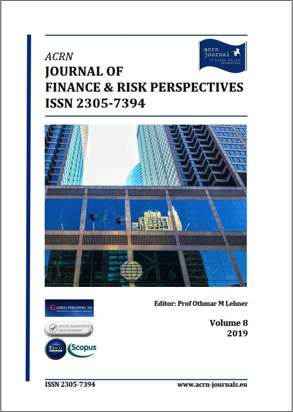Eun Kang,Ryumi Kim, Sekyung Oh, 2019, Dividend Yields, Stock Returns and Reputation, ACRN Journal of Finance and Risk Perspectives, 8 (1), 96-105

Eun Kang, Ryumi Kim, Sekyung Oh
California State University San Marcos University,
Chungbuk National. Konkuk University
Abstract
Problem/ Relevance – The relationship between dividend yields and stock returns is an unresolved issue in finance. Previous papers show mixed results on the relationship. To clarify the relationship, we consider dividend reputation. We investigate whether dividend reputation plays a role in explaining the relationship between dividend yields and stock returns.
Research Objective/ Questions – We hypothesize that firms with dividend reputation tend to have less risk compared to firms without dividend reputation, and the expected return of firms with dividend reputation will be lower given the dividend yield, which is called the “reputation effect.” A mix of firms with and without dividend reputation in a sample could distort the relationship between stock returns and dividend yields. We group stocks according to reputation and analyze the relationship between dividend yields and stock returns.
Methodology – We construct our sample from all firms listed on the NYSE, AMEX, and NASDAQ stock exchanges. In our analysis, reputation effects are included to analyze the relationship between dividend yields and stock returns. We divide our sample firms into three groups according to the track record of dividend payments to control for reputation effects: (1) reputation-established firms, (2) reputation-building initiation, and (3) no reputation firms. To test the hypotheses, we run the panel regression with reputation variables and the control variables.
Major Findings – We find that the reputation effect is strongest for reputation-established firms and a weaker reputation effect for reputation-building younger firms. After controlling the reputation effect and other relevant variables, we find that there does exist a significantly positive relationship between dividend yields and stock returns.
Implications – The empirical results show that the reputation effect is higher for established firms with a good track record of dividend payments than for firms with a short history of dividend payments or for firms with an unreliable history of dividend payments. After controlling the reputation effect and other relevant variables, we find there exists a significantly positive relationship between dividend yields and stock returns. We also find that one year is not enough time for firms to build a dividend reputation.
Keyword: dividend yield, stock return, reputation effect, reputation building
Implications: Our empirical results confirm that the degree of misalignment is reasonable, suggesting a consistency between macroeconomic (especially monetary) policies and the free floating exchange rate regime. Assessing real exchange rate misalignment is a very important issue for policy makers because of the severe welfare and efficiency costs that such misalignment can have for an economy.
Jel Classification: C22, F31, F32
Key words: Equilibrium exchange rate, Co-integration analysis, BEER
Back to Volume 8